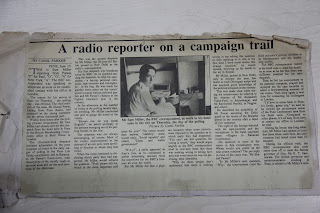A radio (BBC) reporter on a campaign trail
A radio
reporter on a campaign trail
Pune Plus, The Times of India
By Camil
Parkhe
“This is
Sam Miller reporting from Poona; “P” for Paul, “O”, “O”,
“N” for New York, “A”. The BBC correspondent was speaking on
telephone as soon as he established contact with his office in
London.
The reason
for his arrival in Pune on Thursday – the polling day was obvious.
The chief minister of the state, Mr. Sharad Pawar, hailing from Pune
district, had emerged as the strong contender for the prime
ministerial post..
Within three
hours after the polling process commenced, Mr. Sam Miller had already
sent his first dispatch from his hotel suite in Pune to the British
Broadcasting Corporation (BBC) office at Bush House in London.
The
10-minute-long dispatch included information on the poor response of
voters in the early stages of polling in the Pune Lok Sabha
constituency and Baramati, Mr. Pawar’s home-town, with description
of the muddy roads in the rural areas and on-the-spot reaction of the
electorate.
This was the
second dispatch by Mr. Miller, the 28-year-old Briton posted in New
Delhi as the radio’s correspondent.
His first
dispatch was broadcast twice by BBC. As he finished sending the
dispatch, he kept his equipment – a lap-top personal computer,
tape-recorder and microphone – in his bag. He was ready for another
news piece on the voters’ mood towards various political parties
and Mr. Pawar’s chances to the highest executive post in the
country.
In the
afternoon as the number of voters at the polling booths stared
swelling, Mr. Miller conducted exit poll to gauge the mood of the
voters.
“Excuse
me, do you speak English?”, he asked smilingly to the persons
emerging out of the polling booths in the city.
The response
was not always encouraging, of course. Most of the voters,
unaccustomed to the concept of an exit poll, were unwilling to
disclose to whom they had voted.
When the
voters hesitated in disclosing party they had supported, Mr. Miller
would reframe his question. “Well, please tell me, which is the
most important poll issue for you?” The voters would then answer,
‘Stability’, some would replay, ‘social equality’ and “Clean
and stable government?’
“W-h-y?”,
a smile appeared on Sam’s face as he continued to gather
interesting answers from the interviews for the BBC’s listeners all
over the world.
But Mr.
Miller did face a piquant situation when some interviewees objected
to the question as to which party they had supported. “You can’t
ask this question, the voting is secret,” they would argue angrily
as the BBC correspondent tried to convince them that there was
nothing wrong in telling how they had voted since he was not
disclosing their identities.
“Why do
these people don’t understand that there is nothing wrong in me
asking this question or their replying to it, this is the first time
I have across this strange situation,” he would remark, throwing
up his hands in the air in despair.
Mr. Miller,
posted in New Delhi only in January this year, has learnt to read
Devnagari script and has acquired good knowledge of the political
situation in the country.
This was
made clear when during the conversation he referred to the chances of
Mr. Balasaheb Vikhe-Patil, in Ahmednagar, and Mr. Banwarilal Purohit,
in Nagpur, and others.
He described
the possibility of Mr. Pawar assuming the Delhi gaadi as the return
of the Maratha power in the country after a lapse of two centuries.
The sight of
the foreign national with the tape-recorder and the microphone in his
hand surprised many villagers in Baramati constituency.
His question
to most of the voters in this constituency was : Whom would you
prefer as the next prime minister? The pat replay in the most of the
cases was “Mr. Sharad Pawar!”
To Mr.
Miller’s next question, “Why,” the interviewees cited the chief
minister’s proven abilities as an administrator and his leadership
quality.
The BBC
correspondent rushed to his hotel suite to meet his deadlines as soon
as he felt that there was sufficient material for his next dispatch.
Then he fed
his commentary to his personal computer, played and replayed the tape
recorder to select a few interesting answers of the voters. Then once
again it was time for contacting his colleagues in London.
“I’d
love to come back to Pune, It’s lovely, green city,” he said as
he viewed the picturesque scene of the Pune Cantonment area from his
hotel suite. “Compared to other places, it’s so easy from here to
contact my office in London,” he said.
During his
hectic day-long schedule, Mr. Miller had spoken to London three
times, each time, the conversation had lasted more than 10 minutes.
During his
official visit, the BBC correspondent also took some time off to meet
the former governor of Goa, K. T. Satarawala. The former governor
and environmentalist residing in Pune, is related to Mr. Miller’s
wife.

Comments
Post a Comment